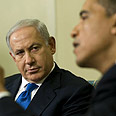
WASHINGTON – US President Barack Obama informed Prime Minister Benjamin Netanyahu that he intends to promote a new regional peace initiative for the Middle East. Speaking to reporters following his meeting with Obama earlier on Monday, the prime minister said that his understanding the regional component will be the key focal point of the new initiative. It will likely be presented in Obama's planned June 4th speech in Cairo.
The US president will be in Egypt as a conclusion to a series of meetings with local leaders – namely Jordan's King Abdullah II, Palestinian President Mahmoud Abbas, Netanyahu, and Egyptian President Hosni Mubarak.
Netanyahu said that the two discussed the currently proposed Arab League initiative, "but only in regards to the markedly more positive spirit displayed by Arab nations compared to the 'Three Nos' adopted in the Khartoum Conference, nothing beyond that."
The prime minister said that Israel shares Obama's view that as many Arab nations as possible should be included in the Palestinian process, "so that they talk directly to Israel."
'The right to defense'
"Israel has the right to defend itself," Netanyahu said when asked about the Iranian threat.
He added that the US president "understands" that Iran must not be allowed to obtain military nuclear capability.
"There is no green light or red light. There is a principle we agreed on. The important thing said is that there is a commitment to an outcome where Iran does not develop military nuclear power. (President Obama) expressed that very clearly," the prime minister said.
Netanyahu failed to persuade the US president to set a timetable for the diplomatic efforts with Tehran.
Obama said he does not see the need for any "artificial" deadline for the talks with the Islamic Republic. He said however that Washington was interested in seeing progress on this front by the end of the year.
The US president said he expects a positive response from his diplomatic outreach to Iran on stopping its nuclear program by the end of the year. He said the United States wanted to bring Iran into the world community but declared "we're not going to have talks forever." Obama said he was not closing off a "range of steps" against Iran, including sanctions, if it continues its nuclear program.
Netanyahu acknowledged the importance of the meeting with the US president, which lasted for over four hours – an hour and 45 minutes of it a private discussion between the two leaders. The prime minister characterized the meeting as positive and amicable, and said both leaders believed they could work with one another. "He expressed a deep commitment to Israeli-US ties, and a commitment to Israel's security," Netanyahu said.
'Two-states or Hamas state?'
On the Palestinian track he added that in addition to demanding "concrete moves on Israel's part," Obama recognizes that the Arab world most also do the same towards Israel.
Netanyahu said he is willing to start talks with Abbas "immediately," but refused to discuss the possibility of the US administration setting a timetable for the process. "I'm not going into that," he said.
The prime minister stressed that he did not use the term 'two-states for two-peoples' in his meeting with Obama. "First we must see if that state is, for example, a Hamas state. How do you guarantee it won't be a Hamas state? This is a fundamental question. The terminology is important, yes, but the fundamentals are more important. This is what we want to know."
Netanyahu said that he told the US president the Palestinian Authority could have control over everything save for an army of its own or the ability to bring in weaponry. "If there is an understanding about the fundamentals, the other problems will be solved," he said.
The prime minister said he was confident in the steadfastness of the bilateral relations between Israel and the United States.
He also discussed the American demand that Israel freeze all construction in the settlements, saying such a move "would need to be realized as part of the commitments made by both sides. Israel went beyond (just freezing construction) in the Gaza Strip by dismantling settlements, and instead of dismantling terrorism, (the Palestinians) built a terror infrastructure in Gaza."
Roni Sofer contributed to this report















